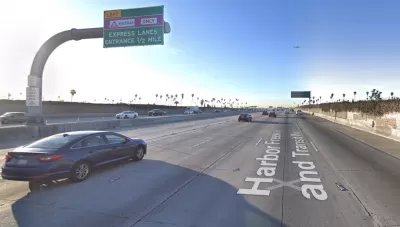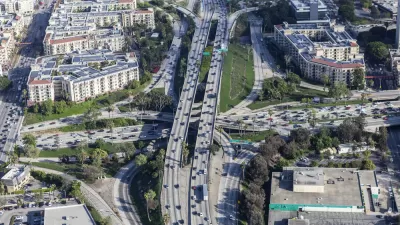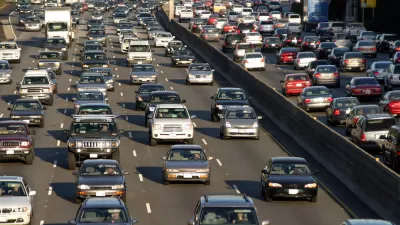Solo drivers who paid a variable toll to use the 10 and 110 freeways in Los Angeles provided $1.4 million to assist in the purchase of the nation's first electric double-decker buses, to be operated by Foothill Transit

High occupancy toll (HOT) lanes, more often called express lanes by transportation agencies and sometimes Lexus lanes by their critics, are inherently controversial.
“Are we trying to get people out of their cars, or are we encouraging those willing to pay to stay in their cars?” asked San Francisco Supervisor Ahsha Safaí about a San Francisco County Transportation Authority study to convert portions of two freeways to express lanes, report Matier & Ross for the San Francisco Chronicle on July 9. “For some people, it’s a question of equity,” Supervisor Aaron Peskin added.
Can revenues from solo drivers who are "willing to pay to stay in their cars" to access the carpool lane mitigate the equity objection?
The two skeptical supervisors might be impressed by how the Los Angeles County Metropolitan Transportation Authority (Metro), which has been operating HOT lanes on the 110 and 10 Freeways since 2012 and 2013, respectively, invest revenues from the Metro ExpressLanes.
"Foothill Transit purchased two electric double-decker buses, costing $1.6 million each," reports Claire Tran for CityLab on July 12. "They’re partially funded by a $1.4 million Metro Express Lanes Toll Revenue Capital Grant received earlier this year."
According to the Metro budget [pdf], "ExpressLanes toll revenues are expected to come in at $63 million in FY18, which equates to a 5.0% increase from the FY17 budget, based on year-to-date actuals." [Pg. 32, or 18/41].
The buses should begin operations next year transporting passengers "along a 35-mile route between downtown Los Angeles and Claremont," adds Tran.
Bus manufacturing company Alexander Dennis will pair its towering Enviro500 model with Proterra’s record-breaking E2 battery: Last September, the company set the world record for driving the longest distance, over 1,100 miles, on a single charge of an electric vehicle.
According to Proterra, the purchase by San Gabriel Valley-based Foothill is "North America’s first electric double deck bus order for a public transit agency."
While the zero-emissions bus aligns with the state's goals for reducing both criteria pollutants and greenhouse gas emissions, the double-decker style is a benefit from a transit operations perspective as well.
Previously, 60-foot articulated buses served 50 customers along this route, but the extra length made it difficult to find longer bus stops downtown. Comparatively, the double-deckers have better maneuverability and serve 80 customers.
The real selling point for us, frankly, was the quality of the ride,” said Felicia Friesema, director of marketing and communications at Foothill Transit. “The articulated buses, because they have that bendable section in the middle, can sometimes be a little bumpy on the freeway."
And passengers will find the new buses quieter as well. "The back of a diesel bus can be as loud as 90 decibels, said Proterrra CEO Ryan Popple, making for a better environment to utilize the on-board WiFi.
"Currently, less than 10 percent of Foothill Transit’s fleet is electric, though the agency aims to transition to a fully electric fleet by 2030," adds Tran.
FULL STORY: Electric Double-Decker Buses Are Coming to L.A.

Planetizen Federal Action Tracker
A weekly monitor of how Trump’s orders and actions are impacting planners and planning in America.

Maui's Vacation Rental Debate Turns Ugly
Verbal attacks, misinformation campaigns and fistfights plague a high-stakes debate to convert thousands of vacation rentals into long-term housing.

San Francisco Suspends Traffic Calming Amidst Record Deaths
Citing “a challenging fiscal landscape,” the city will cease the program on the heels of 42 traffic deaths, including 24 pedestrians.

Amtrak Rolls Out New Orleans to Alabama “Mardi Gras” Train
The new service will operate morning and evening departures between Mobile and New Orleans.

The Subversive Car-Free Guide to Trump's Great American Road Trip
Car-free ways to access Chicagoland’s best tourist attractions.

San Antonio and Austin are Fusing Into one Massive Megaregion
The region spanning the two central Texas cities is growing fast, posing challenges for local infrastructure and water supplies.
Urban Design for Planners 1: Software Tools
This six-course series explores essential urban design concepts using open source software and equips planners with the tools they need to participate fully in the urban design process.
Planning for Universal Design
Learn the tools for implementing Universal Design in planning regulations.
Heyer Gruel & Associates PA
JM Goldson LLC
Custer County Colorado
City of Camden Redevelopment Agency
City of Astoria
Transportation Research & Education Center (TREC) at Portland State University
Jefferson Parish Government
Camden Redevelopment Agency
City of Claremont





























